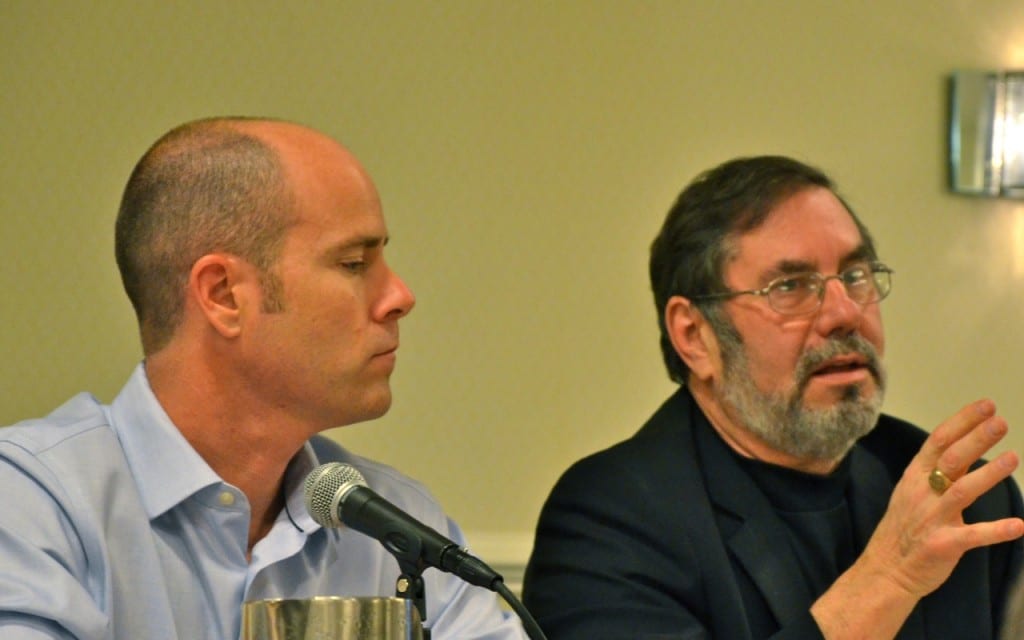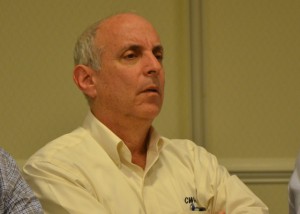
An Unlikely Alliance? The Sierra Club’s Michael Brune alongside United Steelworkers president Leo W. Gerard: Glynn Wilson
By Glynn Wilson –
WASHINGTON, D.C. — Some of the most powerful union leaders and environmentalists in the country came together in the nation’s capital this week to find common ground on the critical question of how to create jobs and improve the economy while at the same time protecting the environment of the U.S. for the future and reclaiming democracy.
The central message in the “Good Jobs, Green Jobs” conference that kicked off Monday afternoon was that the country faces significant challenges in trying to create jobs, rebuild the nation’s infrastructure and prepare for the inevitability of climate change due global warming from the burning of fossil fuels. That is the question for the leaders of the nation’s largest environmental organizations and labor unions as they struggle to build a national movement to combat climate change while creating good-paying jobs in every corner of the country.
“Where do the concerns of workers and environmentalists intersect? Why is environmental protection important to workers, and why should environmentalists support collective bargaining and workers’ voice on the job? And, facing these significant environmental and economic challenges, how do these two movements come together in an effective way to build a stronger economy and a cleaner environment?”
Those are the critical questions, according to the group’s agenda.
The first session kicked off Monday with a panel of experts and pioneers in dealing with these issues moderated by David Foster, executive director of the BlueGreen Alliance and president of the BlueGreen Alliance Foundation.
“One of the things all our organizations share is a desire for change,” Foster said. “All of us are driven by a desire to improve our jobs, create jobs and reduce exposure to toxic chemicals in our communities, clean up our air and water. How do we work more successfully for the change we want?” he asked. “How do we work together across American with a coalition of 15 million members and turn this into a real agent for change?”
In the wake of Superstorm Sandy and the devastating drought in the mid-west and Texas and other impacts of climate change that are costing working people thousands of jobs, he said, it is critical to communicate a shared vision of good jobs and a clean environment. “How do we build a movement that breaks the perceived notion that we have to trade off environmental protection for economic development?”
Leo W. Gerard, international president of the United Steelworkers, shared his ideas.
“One of the things we want to talk about now is to take advantage of the most unity we can bring about,” he said. “I feel very strongly that the only environmental movement can’t do this by themselves. The labor movement can’t do it by itself. Probably the environmental movement and the labor movement still can’t do it by itself. We need the support of all kinds of progressive groups concerned about the future. And we need to do this in a way that creates jobs.”
“The biggest challenge we have when we come out into the political environment is when people come out of institutions with some measure of credibility and attack us that we’re doing away with jobs,” he said. “That becomes a very high hurdle. But I think we can put together a program that I believe fundamentally in the long run that’s going to have more jobs than we have now.”
There’s a lot of challenges ahead, he said.
“We won’t always agree on everything,” he said to some laughter and applause, because there are some fundamental differences in the way union members look at the world and how avowed environmentalists think about things.
“We need to go after the low hanging fruit that’s going to create jobs,” Gerard said. “We have a message we can bring forward.”
More than 50 percent of the schools in America are more than 60 years old, he said.
“That means they’re energy inefficient. There probably not the cleanest places for sucking in the air our kids breath,” he said. “It’s not the best place to have a learning environment.”
He indicated there are millions of jobs in retrofitting schools.
“Most of our public buildings are more than 50 years old,” he added. There are a “huge” number of jobs that could be created there. Then there’s industrial retrofitting.
“We’re going to have all kinds of debate about a certain (Keystone XL) pipeline,” he said. “But we’ve got 2 and a half million miles of pipelines in America, of which 60 percent is more than 50 years old.”
The Blue Green Alliance and the AFL-CIO adopted a statement on retrofitting those pipelines to the current scientific standard.
“There’s more steel in a wind turbine than there is in building a hundred cars,” he said. “People don’t understand that. But I think the public is on our side.”
He said the Blue Green Alliance has 15 million members, but they are not all activated.
“Let’s get them all activated and surprise the shit out of everybody,” he said.
When Michael Brune, executive director of the Sierra Club, came onboard about three years ago, in addition to moving the nation’s oldest environmental protection group in a more activist direction, he said there was a lot of enthusiasm about not just opposing and stopping things but finding solutions. The success of the organization over the past few decades has come from stopping the construction of new fossil fuel facilities or resisting certain pipelines or fracking operations because of their impact on the environment and climate change.
The new idea was to be as “innovative, creative and tenacious at creating the world that we want as we were at stopping things,” he said. The Sierra Club has put resources into working with local groups to install solar panels in homes, schools and churches, for example. Politically, they have worked to change the tax credit system to favor wind energy. In state after state, they have worked for strong efficiency standards.
“We can put people to work and cut utility bills at the same time,” he said. “We know this work is hard to do. We cannot do it alone. Our biggest challenge is that we think we can do it alone. There’s this illusion, allure of self-reliance.”
The goal here, he said, is that “we don’t want to just slow the rate at which things get worse, to slow the rate of warming or slow the decline of labor across the country. We actually are fighting to win. We’re fighting to have a significant impact on the issues we care about, whether its workers rights or promoting strong environmental policies.”
The Sierra Club has partnered with communications workers in Florida and Texas and networked with students across the country to build bonds at the grassroots level. It is involved in an initiative to protect democracy by securing strong voting rights, campaign finance reform and to fight the “disfunction” in the U..S. Senate.
“And we are proud of the Sierra Club in that we ourselves are unionized,” he said.
Larry Cohen, president of the Communications Workers of America, expressed his frustration with not having much to show from the past five years in the way of political change after all the work that went into electing a Democratic president in 2008 and a Democratic Congress in 2010.
“We have permanent, structural blocks to change,” he said, even though Hurricane “Super Storm” Sandy showed that global warming is not a fluke, it’s based on science.
“Every scientist that works on this will tell you that if we continue to burn fossil fuels at this rate, the temperature of the earth is going to continue to go up one degree every 10 years and it’s going to destroy everything else, including the workers rights that I’ve spent my entire life on.”
He said by every measure, workers rights are worse off than they were five years ago, and not just in Wisconsin and Michigan. The so-called “right to work” movement is in at least half the states, including New Jersey and Alabama. Pensions are at risk. Health care is being eliminated as a bargaining issue and premiums are going up.
The movement was to be “voters in, money out,” he said. But voter registration in the U.S. is exactly where it was in 1965. Only 70 percent of the voting age population in America are registered to vote, while it is 100 percent in Brazil and Australia and over 90 percent in every other democracy in the world. Thirty states have passed voter suppression laws.
At the same time, the Citizens United vs. FEC Supreme Court ruling only increased the amount of corporate money in elections.
“That’s why we are not getting climate change (legislation),” he said.
It’s why there’s no Labor Relations Board for the first time since 1935. And, he said, there’s no other parliamentary body in the world with rules like the U.S. Senate, where nothing gets to the floor due to the filibuster, and members don’t even have to stand up and talk any more like Jimmy Stewart did as a junior Senator in “Mr. Smith Goes to Washington.”
“We’re going to have to work together on a democracy movement,” he said. “Let’s put together climate change, workers rights and democracy and stand up and fight back.”
Watch the Video
Key segments of the panel discussion














